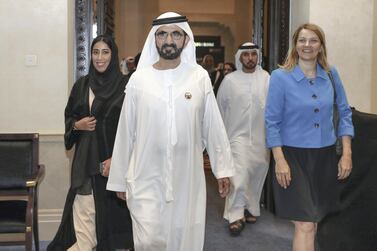Gender equality in the workplace has the power to increase global gross domestic product by up to $8 trillion over the next decade by boosting employee innovation and company output, according to a report by technology firm Accenture.
In companies with a robust culture of gender equality, employees’ willingness and ability to innovate is six times higher than in companies with less equal treatment and representation of male and female staff, the report published on Sunday said.
A culture of equality is therefore a “powerful multiplier of workplace innovation”, with a positive impact on company performance and, in turn, economic growth.
“In our increasingly competitive world, companies must create an environment that encourages and harnesses their employees’ innovative capabilities,” said Alexis Lecanuet, regional managing director for Accenture in the Middle East and Turkey, in a statement.
“Our research has shown that an empowering environment can have a more positive impact on employees’ innovation mindset than even pay rises or advanced degrees.”
The company's Getting to Equal study is based on the findings of an employee survey of more than 18,000 professionals in 27 countries, an executive survey of more than 150 C-suite executives in eight countries, and a model that combines employee survey results with published labour force data.
Respondents were asked questions to determine how successful their company was in creating an “innovation mindset”, including factors like purpose, autonomy, resources, inspiration, collaboration and experimentation.
The more empowering the workplace, the higher the innovation mindset score. For instance, Saudi Arabian employees in robust cultures of equality are three times more likely to say that nothing holds them back from innovating (31 per cent in most equal cultures versus 3 per cent in the least equal cultures), the report found.
Almost all executives (95 per cent) surveyed globally agreed that innovation was vital to business competitiveness, and that a culture of equality is a powerful driver of innovation – more so than other factors that differentiate organisations, such as industry, country or workforce demographics, Accenture said.
However, there is a sizable disconnect between employers’ and employees’ perceptions of what an empowering and equal workplace feels like. While 76 per cent of senior executives surveyed said they empower employees to innovate, only 42 per cent of employees agreed, according to the report.
“It is critical that employers look to not only create a culture of equality but also ensure that their actions and decisions actually have a positive impact on their employees,” Mr Lecanuet said.
The research also found that the “innovation mindset” is stronger in fast-growing economies and countries with high labour market productivity growth. If this marker was raised by just 10 per cent in all countries, global GDP would increase by up to $8trn over 10 years, Accenture said.







